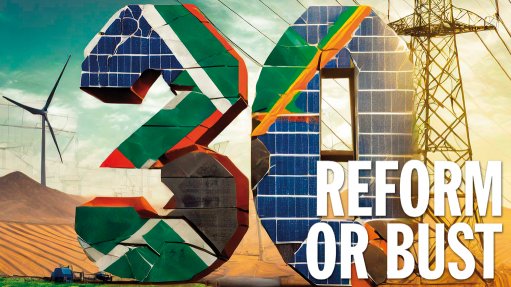More than 290 000 jobs on the line as steel sector continues its decline, Seifsa warns
Over a five-year period, the average 1.3% a year decline in the metals and engineering sector will lead to an average 2.9% decline in employment, or 293 754 direct and indirect job losses, industry organisation Steel and Engineering Industries Federation of Southern Africa (Seifsa) COO Tafadzwa Chibanguza warns.
This is based on the statistics that, between 2008 and 2023, production contracted at a rate of 1.3% a year, while employment decreased by 2.9% a year, which led the sector to lose 214 636 jobs, or 37.2%, since then. There are 362 871 people currently employed in the sector, down from the 577 507 people employed in 2008.
"Employment in the sector has decreased at double the rate by which production has decreased over the same period. Given that the steel sector has an induced economic multiplier of 2.7 times, an employment multiplier of six times and a dependency ratio of between seven and ten people relying on each formal job, the sector's employment trend spells wide-scale social and economic disaster," he says.
The sector is a crucial supplier of inputs into other sectors, such as agriculture, mining, the automotive sector, construction, the electricity supply industry across all its facets, logistics and water sectors. Further, the sector is export intensive, with 40% of total production being exported, raising the country’s foreign exchange receipts by $20-billion a year.
With the recent announcement by ArcelorMittal South Africa of the closure of its operations in Newcastle and Vereeniging, as well as ArcelorMittal Rail and Structural, the prospect of such developments materialising is a major cause of concern that will only exacerbate the downward spiral of employment in the sector, he adds.
"The long products operations under consideration for closure include the country’s only local mill capable of producing long steel from iron-ore, which are critical in industries such as construction, automotive, mining, electro-technical, electricity transmission, rail, wire and fasteners industry.
"The reliance of these downstream industries is not a preference question but rather higher quality and safety specifications. Faced with the prospect of a lack of domestic supply, these downstream industries will have no alternative but to look to import their feedstock, which translates to the loss of much needed domestic jobs, further deepening the unemployment crisis," says Chibanguza.
Of the 362 871 people employed in the sector, the downstream industries account for 90% of the employment with the balance being employed in the upstream. This number has evolved from 80% downstream and 20% upstream over the past 15 years.
Additionally, although the job losses have been felt across the entire value chain, they have mostly been concentrated in the downstream industries, which have accounted for 60.2% of the losses recorded over this period.
"The impact of the plant closures will mostly be felt in the downstream where the bulk of employment resides."
A greater concern is that several downstream companies have started estimating the business cases of importing their final product, as opposed to semi-finished products such as billets, blooms, among others, for further processing locally. This will have even wider employment ramifications by eliminating other intermediate processes like forging, galvanising and packaging, thereby converting many existing factories into distribution warehouses, he adds.
"The reasons for the AMSA plant closure are structural, namely low economic growth, anaemic gross fixed capital formation, and electricity and logistics challenges. These are factors faced by companies in the entire value chain and without urgent intervention and reform are unlikely to be resolved in the medium term.
"It is conceivable, therefore, that in the absence of reform, the rate of employment declines observed thus far can be projected into the medium term with some modifying factors applied to account for the AMSA closure," Chibanguza says.
The steel and engineering sector is the backbone of the country’s industrial base. In addition to productivity gains in the manufacturing sector leading to economic growth, higher income elasticity of demand for manufactured goods and the spill-over of growth to non-manufacturing sectors in response to growth in manufacturing output are also benefits.
"The steel and engineering sector is also a strategic avenue through which the country converts its vast mineral endowment to final engineered products. This locks in a higher degree of value add domestically.
"The loss of employment is an untenable outcome for South Africa, given its untenable unemployment rate. Doing everything possible to find lasting solutions to averting the announced plant closures should dominate our and government's agenda," he says.
Comments
Press Office
Announcements
What's On
Subscribe to improve your user experience...
Option 1 (equivalent of R125 a month):
Receive a weekly copy of Creamer Media's Engineering News & Mining Weekly magazine
(print copy for those in South Africa and e-magazine for those outside of South Africa)
Receive daily email newsletters
Access to full search results
Access archive of magazine back copies
Access to Projects in Progress
Access to ONE Research Report of your choice in PDF format
Option 2 (equivalent of R375 a month):
All benefits from Option 1
PLUS
Access to Creamer Media's Research Channel Africa for ALL Research Reports, in PDF format, on various industrial and mining sectors
including Electricity; Water; Energy Transition; Hydrogen; Roads, Rail and Ports; Coal; Gold; Platinum; Battery Metals; etc.
Already a subscriber?
Forgotten your password?
Receive weekly copy of Creamer Media's Engineering News & Mining Weekly magazine (print copy for those in South Africa and e-magazine for those outside of South Africa)
➕
Recieve daily email newsletters
➕
Access to full search results
➕
Access archive of magazine back copies
➕
Access to Projects in Progress
➕
Access to ONE Research Report of your choice in PDF format
RESEARCH CHANNEL AFRICA
R4500 (equivalent of R375 a month)
SUBSCRIBEAll benefits from Option 1
➕
Access to Creamer Media's Research Channel Africa for ALL Research Reports on various industrial and mining sectors, in PDF format, including on:
Electricity
➕
Water
➕
Energy Transition
➕
Hydrogen
➕
Roads, Rail and Ports
➕
Coal
➕
Gold
➕
Platinum
➕
Battery Metals
➕
etc.
Receive all benefits from Option 1 or Option 2 delivered to numerous people at your company
➕
Multiple User names and Passwords for simultaneous log-ins
➕
Intranet integration access to all in your organisation




















